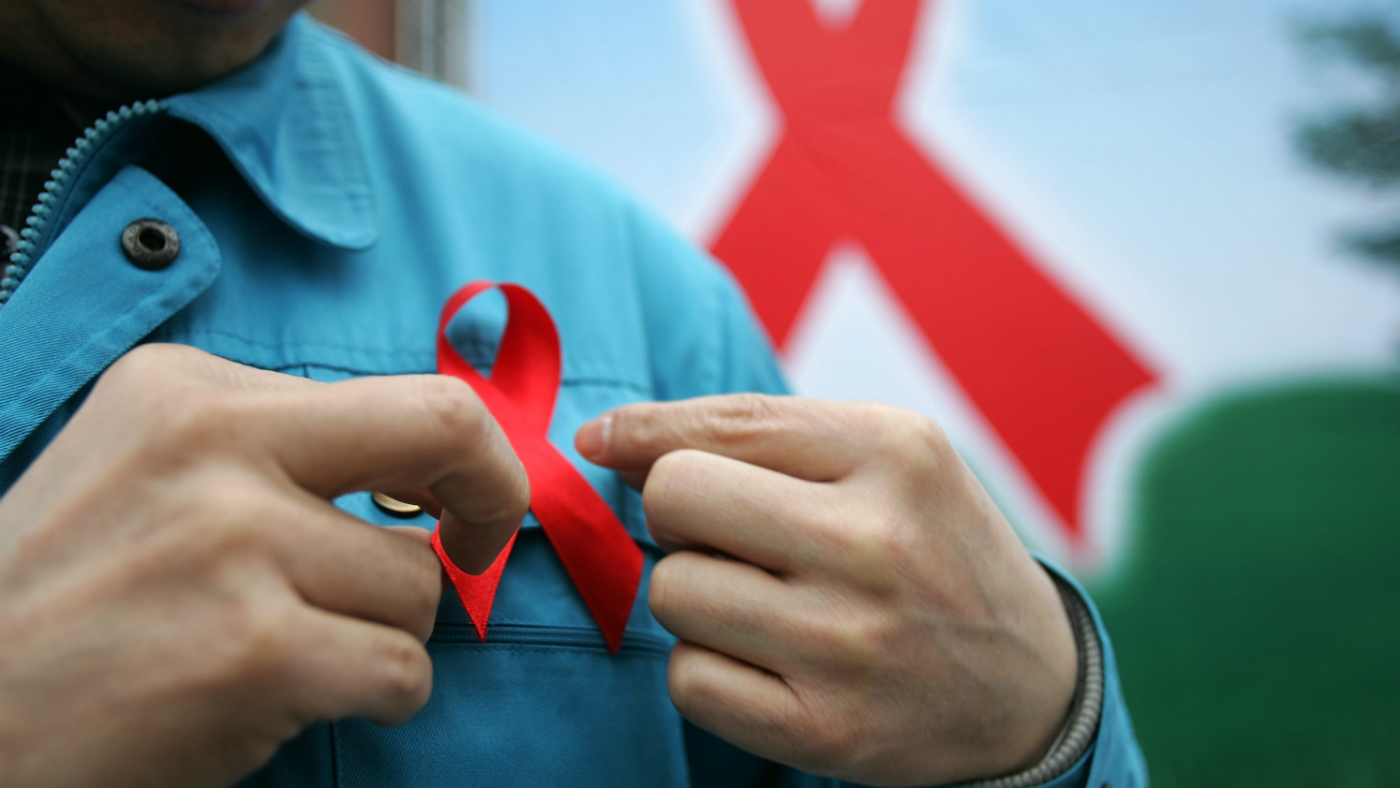How the UK could end HIV transmission by 2030
Charities mark World Aids Day by calling for wider testing to halt new transmissions of the virus

A free daily email with the biggest news stories of the day – and the best features from TheWeek.com
You are now subscribed
Your newsletter sign-up was successful
As the world grapples with the effects of Covid-19, a more protracted battle against a pandemic that has claimed far more lives continues to be fought.
To mark World Aids Day, campaigners are renewing calls for the government to honour an existing commitment to eliminate HIV transmission in the UK by 2030.
Medical science has already made massive headway in tackling the virus. As Deutsche Welle notes, “for most people, an HIV diagnosis in the 1980s was an automatic death sentence”. Four decades later, the NHS says life expectancy averages for HIV-positive patients are “near normal”.
The Week
Escape your echo chamber. Get the facts behind the news, plus analysis from multiple perspectives.

Sign up for The Week's Free Newsletters
From our morning news briefing to a weekly Good News Newsletter, get the best of The Week delivered directly to your inbox.
From our morning news briefing to a weekly Good News Newsletter, get the best of The Week delivered directly to your inbox.
But is eradication really in reach?
Where are we now?
The rate of HIV transmission in the UK steadily declined from a peak in the 1980s before spiking again in the 2000s. But since then, the drop in transmission has accelerated.
According to the most recent report from Public Health England, “the total number of people newly diagnosed with HIV continued to decrease in 2019 to 4,139” - a 10% fall from 4,580 in 2018, and down by 34% from 6,312 new diagnoses reported in 2014.
A free daily email with the biggest news stories of the day – and the best features from TheWeek.com
“The decline in new HIV diagnoses in recent years is largely driven by a steep fall in diagnoses among gay and bisexual men”, among whom confirmed cases have almost halved in the past five years to reach 1,700 in 2019, the report says.
Mortality rates among people with HIV have “remained stable, with 622 deaths” in 2019 - which equates to an average mortality rate of 631 per 100,000 people diagnosed with the virus.
A total of 105,200 people were estimated to be living with HIV in the UK last year.
Can we stop transmission by 2030 - and how might we do it?
The drastic declines in the number of people testing positive for HIV “in most populations and in most settings” over the last few years “shows that, if progress is maintained, the UK could be a very low-incidence country by 2030”, says information site AidsMap.
According to the government, “the goal of eliminating HIV transmission by 2030 depends upon sustaining prevention efforts and further expanding them to reach all at risk”.
Public Health England has suggested that measures necessary to tackle the virus include an increase in testing in non-traditional settings such as A&E departments, prisons and via self-testing; more consistent testing of people who come to clinics with symptomatic STIs; and instituting routine commissioning of pre-exposure prophylaxis, a preventative drug which helps reduce the risk of transmission in high-risk individuals.
Dr Noel Gill, Head of STIs and HIV at Public Health England, said earlier this year that “we are well on our way” to wiping out HIV transmission by the start of the next decade.
“Testing is a key part of the UK’s success - if you have HIV you can benefit from life-saving treatments that also prevent further transmission of the virus,” he continued.
“Certain groups of people are at higher HIV risk and are advised to have regular tests, including men and women who have had unprotected sex with new or casual partners from countries where HIV is common, who should test every year, and men who have sex with men.”
Welcoming data showing continuing declines in transmission in the UK, Health Secretary Matt Hancock said that “HIV has brought untold hurt and suffering to so many”.
“We should be rightly proud of the incredible progress we have already made” in reducing infection levels, he added.
What else is being done?
To mark Worlds Aids Day on 1 December, England’s first HIV Commission - established by the Terrence Higgins Trust, National Aids Trust and Elton John Aids Foundation - is publishing “20 recommendations” to help halt new transmissions in the UK within the next ten years, Reuters reports.
The campaigners are calling for “HIV testing to be standard practice for patients registering with a new doctor, undergoing routine smear tests or being admitted to hospitals’ emergency departments”, the news agency reports. Under the plans, “tests would also be available at pharmacies in areas with a high prevalence of HIV”.
The UK’s 2030 goal mirrors that of the Joint United Nations Programme on HIV/Aids (UNAIDS), which is following a “fast-track strategy” to end the Aids crisis.
The so-called 90:90:90 targets are for 90% of people with HIV to be diagnosed, 90% of diagnosed people to be receiving treatment, and 90% of people on treatment to have an undetectable viral load by 2030.
“To reach this visionary goal after three decades of the most serious epidemic in living memory, countries will need to use the powerful tools available, hold one another accountable for results and make sure that no one is left behind,” the organisation says.
According to the UK government, Britain is “one of the few countries in the world to have reached and exceeded all UNAIDS 90:90:90 targets”. Of the 103,800 people living with HIV in the UK in 2018, 93% were diagnosed, 97% of people diagnosed were receiving treatment and 97% of people receiving treatment were virally suppressed.
-
 6 of the world’s most accessible destinations
6 of the world’s most accessible destinationsThe Week Recommends Experience all of Berlin, Singapore and Sydney
-
 How the FCC’s ‘equal time’ rule works
How the FCC’s ‘equal time’ rule worksIn the Spotlight The law is at the heart of the Colbert-CBS conflict
-
 What is the endgame in the DHS shutdown?
What is the endgame in the DHS shutdown?Today’s Big Question Democrats want to rein in ICE’s immigration crackdown
-
 High Court action over Cape Verde tourist deaths
High Court action over Cape Verde tourist deathsThe Explainer Holidaymakers sue Tui after gastric illness outbreaks linked to six British deaths
-
 Is the US about to lose its measles elimination status?
Is the US about to lose its measles elimination status?Today's Big Question Cases are skyrocketing
-
 A real head scratcher: how scabies returned to the UK
A real head scratcher: how scabies returned to the UKThe Explainer The ‘Victorian-era’ condition is on the rise in the UK, and experts aren’t sure why
-
 Trump HHS slashes advised child vaccinations
Trump HHS slashes advised child vaccinationsSpeed Read In a widely condemned move, the CDC will now recommend that children get vaccinated against 11 communicable diseases, not 17
-
 The stalled fight against HIV
The stalled fight against HIVThe Explainer Scientific advances offer hopes of a cure but ‘devastating’ foreign aid cuts leave countries battling Aids without funds
-
 Vaccine critic quietly named CDC’s No. 2 official
Vaccine critic quietly named CDC’s No. 2 officialSpeed Read Dr. Ralph Abraham joins another prominent vaccine critic, HHS Secretary Robert F. Kennedy Jr.
-
 This flu season could be worse than usual
This flu season could be worse than usualIn the spotlight A new subvariant is infecting several countries
-
 Bluetoothing: the phenomenon driving HIV spike in Fiji
Bluetoothing: the phenomenon driving HIV spike in FijiUnder the Radar ‘Blood-swapping’ between drug users fuelling growing health crisis on Pacific island